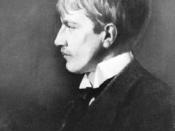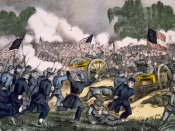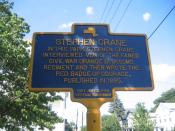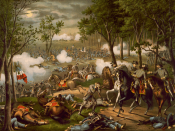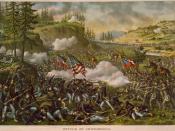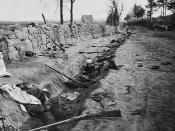Henry Fleming, the protagonist in the novel The Red Badge of Courage, by Stephen Crane, undergoes a series of intense inner conflicts. These conflicts arise when Henry realizes that his ambitions to prevail as a hero are thwarted by the reality that his cowardice will lead him to abandon his comrades in the heat of the battle. On one hand, he has an intrinsic desire to fight patriotically with great valor to acquire the praise of others; on the other hand, the fear of death transcends his desires. Just as Henry's mind is torn in two directions, so is his country, as it is engaged in the Civil War.
He had a burning desire to enlist in the Civil War, which was fueled by passionate images of "Greeklike struggles" and glorious victories in battle. His schoolmates crowded around him and glowed with admiration as he "swelled with calm pride".
He felt an obligated to become a hero on the battlefield. Once enlisted, Henry was assigned to the 304th regiment, however, they settled into camp and did not engage in warfare for months. This was not what Henry expected of the war, and soon grew very restless of his stationary position. He yearned for war, and a chance to prove himself a hero.
The notion of becoming a hero had always been taken for granted by Henry, despite the fact that he had never previously conceived the means of which to attain this goal. Eventually, he was confronted with a shocking realization that there was the possibility of his fleeing when the time to prove himself on the battlefield came. During his sojourn in the provisional camp, this scenario had not once entered Henry's mind. Henry "tried to mathematically prove to himself that he would not run from a battle." The highly anticipated movement arrived as these thoughts were pulling his mind in opposing directions. The first battle was around the corner and the time had arrived for him to earn the admiration and reputation he yearned for. However, his innate instinct for survival causes him to relinquish the dream he had been striving for. With the dream temporarily abandoned, the struggle was cast aside, and he ran from the battle "like a proverbial chicken." As he fled the field, Henry believed that it was the wisest thing to do in the situation that he faced. "His actions had been sagacious things. . . they were the work of a master's legs." This was the logic that filled Henry's mind in an effort to condone his actions and shield himself from the disappointment and shame that was to follow. At this point, the struggle Henry faced to execute heroically, to his despair, was submitting to failure. This casts Henry into a despondent disposition. ADD "He now conceded it to be impossible that he should ever become a hero." After wandering aimlessly among the casualties of the war in his gloomy state, he finally observes other soldiers retreating from their own battles. This sight shed a ray of hope upon his dejected soul, and precisely at this moment, a regiment passes by, marching in the direction of the enemy with no apparent concern for their own lives. "He wondered what those men had eaten that they could be in such haste to force their way to grim chances of death." Their display burdened Henry with the "black weight of his woe" once again. In his mind, the only way to escape his "woe" was a moral vindication, and he began to contemplate joining the group of soldiers, this time without fleeing.
